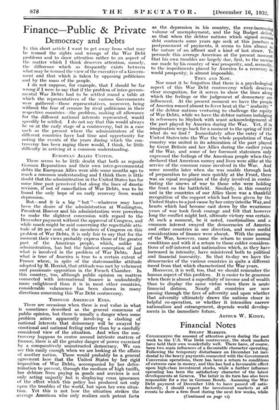THEN AND Now.
Nor must it be forgotten .that there is a psychological aspect of this War Debt controversy which deserves clear recognition, for it serves to show the lines along which the feelings or the judgement of democracy are influenced. At the present moment we have the people of America roused almost to fever heat at the " audacity " of the debtor nations venturing to challenge the equity of War Debts, while we have the debtor nations -indulging in references to Shylock with scant acknowledgement of the part played by America during the War. Yet, if in imagination wego back for a moment to the spring of 1917 what do we find ? Immediately after the entry of the United States into the War the whole population of that country was united in its adniiration of the part played by Great Britain and her Allies during the earlier years of the War, and some of her foremost statesmen only expressed the-feelings of the American people when they declared that American money and lives were alike at the service of the common cause involved in the War. And some months later when she was unable through lack of preparation to place men quickly at the Front, there was an equal recognition of the duty involved in contri- buting the sinews of -war to those who were holding the front on the battlefield. Similarly, in this country and in the countries of our Allies there was a thankful recognition of the support which had been given by the United States to a just cause by her entry into the War, and hearts which had become cast down by the wearisome years of war took fresh courage and felt that however long the conflict might last, ultimate victory was certain. At such a moment, be it noted, emotionalism and a common interest swayed the. democracies of America and other countries in one direction, and mere sordid considerations of finance were absent. With the passing of the War, however, came the return to more normal conditions and with it a return to those colder considera- tions of self-interest and nationalism which, as they have increased in intensity, have ministered both to political and financial insecurity. So that tb-day we have the democracies of the various countries in quite a different mood from that which characterized the War years.
Moreover, it is well, too, that we should remember the human aspect of this problem. It is easier to be generous when there is almost a superfluity of income and of wealth than to display the same virtue when there is acute financial distress. Nearly all countries are now passing through the fires of adversity and upon whether that adversity ultimately -draws the nations closer in helpful co-operation, or whether it intensifies narrow nationalism and estrangement, depends world develop- ments in the immediate future. •
ARTHUR W . KIDDY.






























 Previous page
Previous page